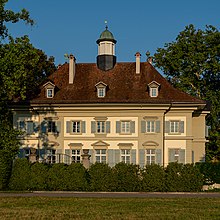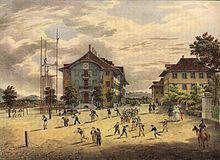Hofwil
Hofwil , historically also Hofwyl , is a settlement in the area of Münchenbuchsee in the canton of Bern , Switzerland . The Wilhof belonged with land and court to the Johanniterkommende Münchenbuchsee and had a pasture community (without Zelggemeinschaft) with the village there.
Hofwil Institute
The pedagogue Philipp Emanuel von Fellenberg bought Gut Hofwil in 1799 with Wylhof Castle, which was built between 1784 and 1786 according to plans by Carl Ahasver von Sinner, and henceforth called it Hofwyl . He set up a model farm there.
In 1804 he founded a school for the poor for neglected children, which Johann Jacob Wehrli took over. According to the ideas of Johann Heinrich Pestalozzi , the children received an elementary school education combined with an agricultural and industrial training. The latter should enable them to build a good and respectable existence in their rural environment.
The school for the poor was an important model for later teacher training. The teachers were supposed to help build a democratic society by taking care of the neglected schools of the rural population. You should encourage the children to come of age, to think independently and to act morally. The concept of Philipp Albert Stapfers , the "Minister of Education" in the Helvetic Republic , envisaged a secular elementary school for all children and professional training for elementary school teachers. At the time of the Helvetic Republic everything stayed the same with the public schools. Only private companies like Fellenberg's Institute in Hofwil were able to implement reforms.
For teachers and sons of higher ranks, the Philanthropin , a high school and professional training, was offered from 1808 . It should enable them to perform their future management tasks competently and responsibly. The school for the poor and the school for the higher classes were boarding schools with high educational ambitions. They had an impact far beyond the country's borders. On July 7th, 1808, the King of Württemberg Friedrich I traveled to Switzerland to visit Gut Hofwil and the "schoolmaster's school" founded there by Carl August Zeller in the same year . The high school was also attended by princes of the royal houses of that time.
In 1807 a training center for young farmers was added and Fellenberg's wife Margaretha von Tscharner (1778–1839) set up an educational institute for young girls of all classes. The schools were housed in Münchenbuchsee Palace and in Hofwil, which has been greatly expanded.
First Bern teachers' seminar
With the liberal constitution of the Republic of Bern of 1831, the renewal of the school system with a democratic elementary school began. For the liberal government, the German-speaking state teachers' seminar in Münchenbuchsee was the core of a new, liberal popular education. Under its first director, Pastor Daniel Friedrich Langhans , who worked from 1832 to 1834, the seminar had the task of professionally training rural school teachers. After a two-year training period, you should be able to give rural children an elementary school education.
Structural changes were necessary in the Münchenbuchsee Castle planned for the teachers' seminar . Therefore, the first three-month “normal course” for 100 school teachers should take place in the buildings of the educational institute in Hofwil, which Philipp Emanuel von Fellenberg and some free teachers made available to the education department. No sooner had the normal course started than there were arguments between the seminar director Langhans and Fellenberg. Fellenberg wanted to limit teacher training to practical and methodical training in the sense of his agricultural school, while Langhans pursued the goal of equipping future teachers with superior knowledge and instructing them to think and judge independently so that they could achieve rapid success in the classroom.
On September 4, 1833, the seminar rooms in Schloss Münchenbuchsee, within the former Johanniterkommende , could be occupied. It was surrounded by the church and farm buildings. In the 19th century, teacher training was adapted to church and rural life.
In May 1852 the conservatives, who temporarily had a majority in the Grand Council, decided to cancel the seminar and dismiss the director Heinrich Grunholzer in order to be able to stop the trend towards liberalization. In November 1852 the seminar was reopened under the newly appointed director Heinrich Morf . Under Hans-Rudolf Rüegg (1860 to 1880) and Pastor Emanuel Martig (1880 to 1905) the seminar was able to develop continuously.
Because the space in the castle was becoming too tight, the headquarters of the Bernese teachers' seminar was relocated to Hofwil in 1884, where the "Big House" had been structurally adapted to accommodate the seminar. From 1904 only the lower seminar was held in Hofwil and the upper seminar in Bern. From 1905 to 1916 Ernst Schneider worked as head of the Oberseminar in Bern, a supporter of the free money theory and psychoanalysis . Johann Zürcher led the seminar in Hofwil from 1914 to 1950. From the 1950s to the 1970s, the seminar in Hofwil and Bern faced a severe shortage of teachers. It had to recruit more teachers. In addition to expanding Hofwil, teacher training was relocated to the regions. Teacher seminars were opened in Langenthal (1962), Biel (1963) and Spiez (1974). The same purpose was pursued in 1971 with the division of the Hofwil and Bern seminars into two seminars. From 1973 the seminar was again conducted with lower and upper grades in Hofwil. The last director was Rudolf Meyer from 1970 to 2001.
In 1997, with the new conception of grammar school education and teacher training, the teachers' seminar became an arts grammar school with boarding school . Since 1998 the grammar school has offered a class train to promote talent in music, design or sport. The teachers' seminar was abolished in 2002 and replaced in 2005 by the Bern University of Education .
In 2009, the Hofwil high school was awarded the Swiss Olympic Partner School quality label by Swiss Olympic .
Well-known students and teachers
- Ernst Bärtschi
- Arthur Bill
- Jörg Ewald Dähler
- Jakob Egger
- Friedrich Eymann
- Georg Friedrich Heilmann
- Victor Aimé Huber
- Simon Gfeller
- Heinrich Grunholzer , director from 1847 to 1852
- Stefano Jacini
- Hans Klee , father of Paul Klee
- Daniel Friedrich Langhans (1796–1875), director from 1832 to 1834
- Emanuel Martig , director from 1880 to 1905
- Armin Mauerhofer
- Christoph Merian
- Albert Meyer
- Rudolf Meyer , director from 1970 to 2001
- Heinrich Morf , director from 1852 to 1860
- Hans Mühlestein
- Theodor Muller
- Jamal Othman
- François Jules Pictet de la Rive
- Karl Rickli , director from 1835 to 1843
- Samuel Röthlisberger
- Hans-Rudolf Rüegg , director from 1860 to 1880
- Hans Saner
- Henri Louis Frédéric de Saussure
- Ernst Schneider , director from 1905 to 1916
- Gustav Schübler
- Friedrich Georg Sibeth
- Johann Kaspar Straub , founder of what was later to become the Wyss private clinic, Münchenbuchsee
- Maximilian Karl von Thurn and Taxis
- Carl August Zeller
- Hans Zulliger , psychoanalytic pedagogue
- Johann Zürcher , director from 1914 to 1950
literature
- Emanuel Martig: Visual psychology with application to education. Bern 1888.
- Emanuel Martig: Report on the Hofwyl seminar for the years 1885–1888. Bern 1889.
- Emanuel Martig: Textbook of pedagogy for teacher seminars as well as for self-teaching . Bern 1890
- Emanuel Martig: History of pedagogy in its basic features with special consideration of the elementary school . Bern 1901.
- Arnold Jaggi: The German teacher training college of the canton of Bern (1833-1933). Festschrift for its centenary . State publishing house for teaching materials, Bern 1933.
- History of the Canton of Bern 1881–1995: Controversial teacher training
- Rudolf Meyer: Teacher Images and Teacher Training in Hofwil. 2009.
- Claudia Crotti, Jürgen Oelkers (Ed.): A long way. The training of Bernese teachers from 1798 to 2002 . Bernischer Lehrmittel- und Medienverlag, Bern 2002.
- Marianne Helfenberger: Aspects of the prehistory of institutionalized teacher training in the canton of Bern 1798–1830 . In: Crotti / Oelkers: A long way. Bern 2002.
- Lucien Criblez: The teachers' seminar in the canton of Bern. Beginning, development and end of a teacher training concept using the example of the state seminar 1830–2000 . In: Crotti / Oelkers: A long way. Bern 2002.
- Denise Wittwer Hesse: The family von Fellenberg and the schools from Hofwyl. Historical Association of the Canton of Bern, Bern 2002. ISBN 3-85731-022-7 .
Web links
- Anne-Marie Dubler : Hofwil. In: Historical Lexicon of Switzerland .
- Homepage of the Hofwil grammar school
- Association "Former Hofwil"
Individual evidence
- ↑ History of the Canton of Bern 1881-1995: Controversial teacher training
- ^ Rudolf Meyer: Teacher pictures and teacher training in Hofwil. . 2009
Coordinates: 47 ° 1 ′ 13 " N , 7 ° 27 ′ 45" E ; CH1903: 601 815 / 207693



